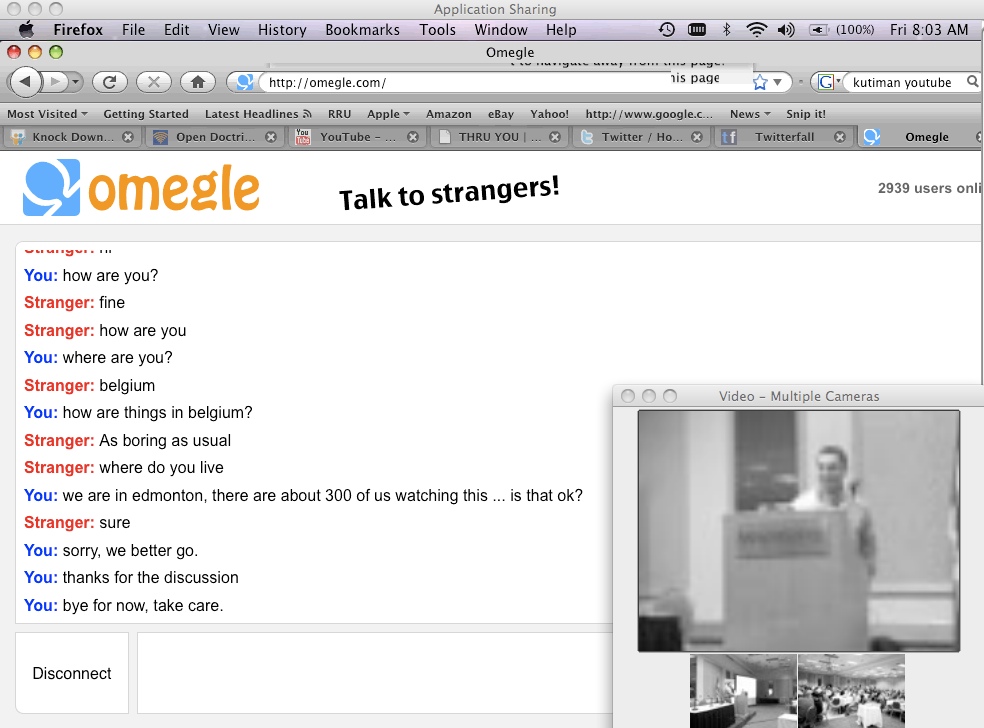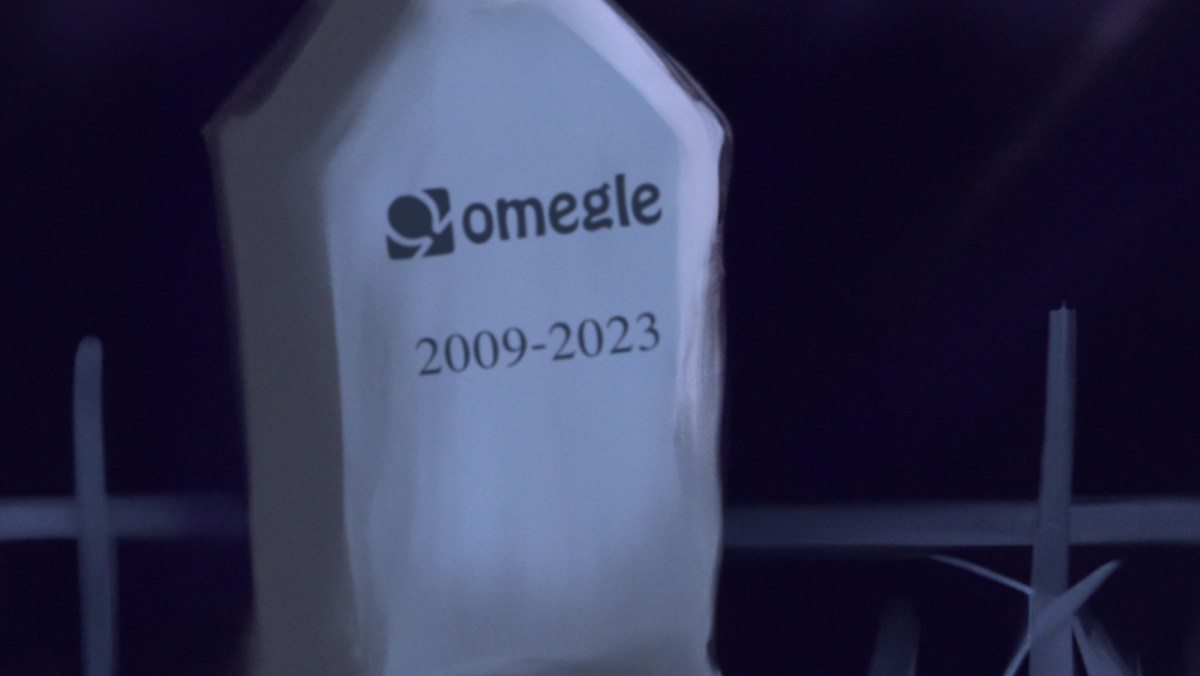Omegle was easily the most popular anonymous chatting service available on the internet during the late 2000s. As IRCs lost their steam and internet users began gravitating to MSN Messenger and Skype, Omegle let random internet users meet each other through shared interests. A little lo-fi by nature, Omegle reintroduced a/s/l (age, sex, location) into the popular internet lexicon—and also connected adults with each other to engage in cybersex.
At first, the pandemic brought Gen Z onto Omegle in droves, seemingly integrating a new group of young internet users into its chaotic community. Now, Omegle is gone, as the company has shuttered its service after facing numerous legal challenges related to its anonymous features.
Why did Omegle shut down?
Omegle offered online communication with strangers through instant messaging and video calls. These features allowed adults to meet one another, whether for small talk or online sexual encounters.
However, Omegle’s anonymous nature allegedly allowed the site to serve as a haven for sexual predators targeting young internet users. According to the BBC, Omegle has appeared in over four dozen cases involving child predators, including 20 in the U.S. alone. In 2022, a U.S. District Court concluded that Omegle would not be protected under Section 230 in a lawsuit, as the site’s design “led to the interaction between an eleven-year-old girl and a sexual predator in his late thirties.”

On November 8, Omegle closed its doors. In a lengthy farewell message, founder Leif K-Brooks alluded to the growing social and legal strain weighing down the site. Particularly, K-Brooks admitted Omegle had both “highlights” and “lowlights,” as “virtually every tool can be used for good or for evil.”
“There can be no honest accounting of Omegle without acknowledging that some people misused it, including to commit unspeakably heinous crimes,” K-Brooks said.
While K-Brooks ultimately defended Omegle against accusations that the company did not do enough to monitor child sexual abuse and online predation, he concluded that it was simply not feasible to simultaneously run and legally defend Omegle.
“As much as I wish circumstances were different, the stress and expense of this fight—coupled with the existing stress and expense of operating Omegle, and fighting its misuse—are simply too much,” K-Brooks concluded. “Operating Omegle is no longer sustainable, financially nor psychologically. Frankly, I don’t want to have a heart attack in my 30s.”
How did Omegle defend itself in its farewell message?
It’s alarming that Omegle was mentioned over 50 times across various lawsuits regarding online child sexual abuse. Allegations and lawsuits against Omegle tend to mirror each other, too, suggesting a larger risk of sexual exploitation was at the heart of the site’s design. A $22 million lawsuit claimed an adult Omegle user manipulated a teenage girl into sending him intimate photos of herself, while a 21-year-old sexual predator reportedly utilized Omegle to document young girls engaging in sexually explicit acts, according to Rolling Stone.
K-Brooks argued that Omegle did try to take steps to combat child sexual abuse on its platform. In the site’s final message, K-Brooks claimed Omegle offered “a great deal of moderation behind the scenes,” such as a “state-of-the-art AI operating in concert with a wonderful team of human moderators.”
“Omegle punched above its weight in content moderation, and I’m proud of what we accomplished,” K-Brooks wrote. “Omegle worked with law enforcement agencies, and the National Center for Missing and Exploited Children, to help put evildoers in prison where they belong. There are ‘people’ rotting behind bars right now thanks in part to evidence that Omegle proactively collected against them, and tipped the authorities off to.”
It’s unclear if Omegle actually had an extensive moderation team. According to two Omegle insiders who spoke with the BBC, K-Brooks largely operated the site by himself without any additional human moderation presence.
Was it fair to shut down Omegle?

There’s another side to K-Brooks’ farewell message: Criticism of the criticisms. The site’s creator admitted that Omegle deserved scrutiny for whether it effectively prevented child grooming, but he also believed criticism of Omegle devolved into attacks that “felt anything but constructive.”
“Omegle is the direct target of these attacks, but their ultimate victim is you: All of you out there who have used, or would have used, Omegle to improve your lives, and the lives of others,” K-Brooks wrote. “When they say Omegle shouldn’t exist, they are really saying that you shouldn’t be allowed to use it; that you shouldn’t be allowed to meet random new people online. That idea is anathema to the ideals I cherish—specifically, to the bedrock principle of a free society that, when restrictions are imposed to prevent crime, the burden of those restrictions must not be targeted at innocent victims or potential victims of crime.”
K-Brooks’ final notice draws on C.S. Lewis and Douglas Adams to prove his point, and makes the false equivalency that closing Omegle is like “the idea that society ought to force women to dress modestly in order to prevent rape.” Implying Omegle should not be censored in the fight to combat child sexual abuse, he wrote “irrespective of what rapists do, women’s rights should remain intact.”
“Analogies are a limited tool, but a physical-world analogy might be shutting down Central Park because crime occurs there—or perhaps more provocatively, destroying the universe because it contains evil,” K-Brooks said.
There are certainly ongoing pushes to censor the web, particularly by deplatforming sex workers from major social media platforms. However, there’s a compelling argument to be made that Omegle did not effectively implement a design structure that prevented online abuse from happening over its anonymous messaging system. Moderation is an enormous and expensive endeavor, and dozens of lawsuits seemed to cite Omegle as playing some role in young users being groomed.
Omegle can claim that it is being censored on the internet. But did the site actually create a safe place for its most vulnerable users? That’s a separate question altogether—with many legal cases suggesting the answer is “no.”
(featured image: Omegle)









Published: Nov 9, 2023 04:40 pm